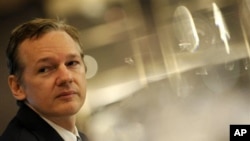The founder of the website WikiLeaks is in jail in London after being arrested on a European warrant in connection with a rape case in Sweden.
A British judge denied Julian Assange bail Tuesday. The founder of WikiLeaks surrendered to police and was arrested on behalf of Swedish authorities in connection with a rape case in Sweden.
The Swedish prosecutor has said the case is not connected to WikiLeaks, but Mark Stephens, one of Assange's London lawyers believes the Swedish warrant is connected to the release of U.S. diplomatic cables by WikiLeaks.
Related video report by Laurel Bowman:
"The timing of this has got to be related to the cables. We have to remember that the Swedes dropped any allegations of sexual misconduct against Julian Assange as long ago as September of this year."
Stephens says his client tried to meet with the prosecutor before he left Sweden earlier this year but she refused.
Last week Interpol made public a red notice or an international wanted persons alert for Assange. Stephens has called the actions of the Swedish prosecutor persecution.
"She has been running away from him and has sent out stop notices, which are usually secret, and these warrants, all in the week that WikiLeaks is suffering cyber attacks and is also releasing the cables. And one has to, as a lawyer for Julian Assange, just think very carefully about the fact that Sweden was just one of those countries where a lot of extraordinary rendition flights went through."
Stephens was referring to the clandestine transfers of suspected terrorists the United States conducted with the help of a handful of countries.
Wikileaks has been under pressure since it began releasing 250,000 secret U.S. diplomatic cables last week. U.S. officials claim the action has put national security at risk.
Assange is an Australian citizen and while the country's attorney general said Assange has a right to consular support, Australia's Prime Minister, Julia Gillard, says the country is investigating whether a crime was committed in Australia.
"The foundation stone of it is an illegal act. Information was taken and that was illegal. So, let's not try and put any glosses on this. It would not happen, information would not be on WikiLeaks, if there had not been an illegal act undertaken."
British journalist John Pilger is one of several prominent figures who vouched for Assange in court and offered to put up bail. He condemned the Australian prime minister's accusations.
"Julie Gillard had no right to say, to comment as she did, that what WikiLeaks has done was illegal. There is nothing illegal about what WikiLeaks has done, there is nothing illegal about what Julian Assange has done. He deserves the support of his government at his very least."
The U.S. State Department spokesman says his country is looking into whether Assange broke any U.S. laws and would not comment on whether America would seek extradition.
David Banisar is the senior legal counsel for the freedom of speech organization Article 19 here in London. He says he does not believe American Espionage law applies to Assange.
"There's no laws in the U.S. that would really apply to him in this case. Obviously his sources could be prosecuted under their obligations as government employees to not release classified secret information, but as a journalist-type recipient, no he can't be prosecuted."
A number of companies have abandoned WikiLeaks, including American Internet service providers, and online payment company PayPal and credit card companies Visa and MasterCard, main financial conduits for donations to WikiLeaks. Banisar says those practices are troubling.
"These kinds of companies are the middlemen to the Internet and if it turns out that the middlemen aren't very supportive of free speech, it really does undermine the right of free speech."
Lawyer Mark Stephens says Assange's detention will not affect the Internet site.
"I am advised that WikiLeaks can continue to exist, that a number of their operatives, they have many thousands of journalists in a virtual journalistic community around the world and they will continue. We are only [at] cable 301 today, we will see the rest of those 250,000 cables coming out so that full information is available."
Stephens says he plans to reapply for bail for Assange who is scheduled to appear in court again December 14.




